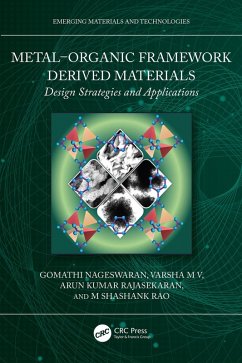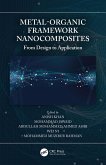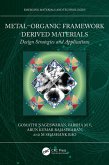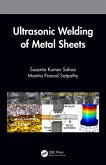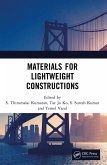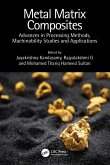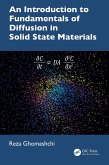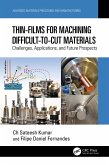Gomathi Nageswaran, Varsha M V, Arun Kumar Rajasekaran, M Shashank Rao
Metal-Organic Framework Derived Materials (eBook, ePUB)
Design Strategies and Applications
51,95 €
51,95 €
inkl. MwSt.
Sofort per Download lieferbar

26 °P sammeln
51,95 €
Als Download kaufen

51,95 €
inkl. MwSt.
Sofort per Download lieferbar

26 °P sammeln
Jetzt verschenken
Alle Infos zum eBook verschenken
51,95 €
inkl. MwSt.
Sofort per Download lieferbar
Alle Infos zum eBook verschenken

26 °P sammeln
Gomathi Nageswaran, Varsha M V, Arun Kumar Rajasekaran, M Shashank Rao
Metal-Organic Framework Derived Materials (eBook, ePUB)
Design Strategies and Applications
- Format: ePub
- Merkliste
- Auf die Merkliste
- Bewerten Bewerten
- Teilen
- Produkt teilen
- Produkterinnerung
- Produkterinnerung

Bitte loggen Sie sich zunächst in Ihr Kundenkonto ein oder registrieren Sie sich bei
bücher.de, um das eBook-Abo tolino select nutzen zu können.
Hier können Sie sich einloggen
Hier können Sie sich einloggen
Sie sind bereits eingeloggt. Klicken Sie auf 2. tolino select Abo, um fortzufahren.

Bitte loggen Sie sich zunächst in Ihr Kundenkonto ein oder registrieren Sie sich bei bücher.de, um das eBook-Abo tolino select nutzen zu können.
This book explores MOF-derived materials focusing on their structural features, synthesis methods, unique properties and versatile applications including underlying chemistry. It covers research developments in field for design of novel carbon materials and metal-based materials from MOF and their composites including specific applications.
- Geräte: eReader
- mit Kopierschutz
- eBook Hilfe
Andere Kunden interessierten sich auch für
![Metal-Organic Framework Nanocomposites (eBook, ePUB) Metal-Organic Framework Nanocomposites (eBook, ePUB)]() Metal-Organic Framework Nanocomposites (eBook, ePUB)54,95 €
Metal-Organic Framework Nanocomposites (eBook, ePUB)54,95 €![Metal-Organic Framework Derived Materials (eBook, PDF) Metal-Organic Framework Derived Materials (eBook, PDF)]() Gomathi NageswaranMetal-Organic Framework Derived Materials (eBook, PDF)51,95 €
Gomathi NageswaranMetal-Organic Framework Derived Materials (eBook, PDF)51,95 €![Ultrasonic Welding of Metal Sheets (eBook, ePUB) Ultrasonic Welding of Metal Sheets (eBook, ePUB)]() Susanta Kumar SahooUltrasonic Welding of Metal Sheets (eBook, ePUB)48,95 €
Susanta Kumar SahooUltrasonic Welding of Metal Sheets (eBook, ePUB)48,95 €![Materials for Lightweight Constructions (eBook, ePUB) Materials for Lightweight Constructions (eBook, ePUB)]() Materials for Lightweight Constructions (eBook, ePUB)47,95 €
Materials for Lightweight Constructions (eBook, ePUB)47,95 €![Metal Matrix Composites (eBook, ePUB) Metal Matrix Composites (eBook, ePUB)]() Metal Matrix Composites (eBook, ePUB)47,95 €
Metal Matrix Composites (eBook, ePUB)47,95 €![An Introduction to Fundamentals of Diffusion in Solid State Materials (eBook, ePUB) An Introduction to Fundamentals of Diffusion in Solid State Materials (eBook, ePUB)]() Reza GhomashchiAn Introduction to Fundamentals of Diffusion in Solid State Materials (eBook, ePUB)103,95 €
Reza GhomashchiAn Introduction to Fundamentals of Diffusion in Solid State Materials (eBook, ePUB)103,95 €![Thin-Films for Machining Difficult-to-Cut Materials (eBook, ePUB) Thin-Films for Machining Difficult-to-Cut Materials (eBook, ePUB)]() Ch Sateesh KumarThin-Films for Machining Difficult-to-Cut Materials (eBook, ePUB)48,95 €
Ch Sateesh KumarThin-Films for Machining Difficult-to-Cut Materials (eBook, ePUB)48,95 €-
-
-
This book explores MOF-derived materials focusing on their structural features, synthesis methods, unique properties and versatile applications including underlying chemistry. It covers research developments in field for design of novel carbon materials and metal-based materials from MOF and their composites including specific applications.
Dieser Download kann aus rechtlichen Gründen nur mit Rechnungsadresse in A, B, BG, CY, CZ, D, DK, EW, E, FIN, F, GR, HR, H, IRL, I, LT, L, LR, M, NL, PL, P, R, S, SLO, SK ausgeliefert werden.
Produktdetails
- Produktdetails
- Verlag: Taylor & Francis
- Erscheinungstermin: 13. Dezember 2024
- Englisch
- ISBN-13: 9781040269077
- Artikelnr.: 72464921
- Verlag: Taylor & Francis
- Erscheinungstermin: 13. Dezember 2024
- Englisch
- ISBN-13: 9781040269077
- Artikelnr.: 72464921
- Herstellerkennzeichnung Die Herstellerinformationen sind derzeit nicht verfügbar.
Gomathi Nageswaran is a Professor at the Indian Institute of Space Science and Technology, an autonomous institute under the Department of Space, Government of India. She received her Ph.D. from the Indian Institute of Technology, Kharagpur, India in 2009. Her current research interests include electrochemical sensing, carbon dioxide adsorption and catalytic applications of metal-organic frameworks-based materials, inorganic quantum dots for fluorescence sensors, membrane-based separation for water purification application, plasma surface modification of nanomaterials for enhanced electrochemical activity, and membrane performance.
Varsha M V received her MSc. Degree in Chemistry from Cochin University of Science and Technology, Kerala, India, in 2015. Currently, she is pursuing her Ph.D. degree in Chemistry under the guidance of Dr. N Gomathi, at the Indian Institute of Space Science and Technology (IIST), Thiruvananthapuram, India. Her research work includes development of novel materials based on metal organic framework for the electrochemical sensing of analytes of environmental significance and development of electrocatalysts for water splitting reaction.
Arun Kumar Rajasekaran received his MPhil in Scientific Computing from the University of Cambridge and his bachelor's degree in Material Science from NIT-Trichy, India. Currently, he is pursuing his Ph.D. in Chemistry under the guidance of Prof. David Wales, FRS and Dr. Tom Bennett at the University of Cambridge, UK. His research focuses on the computational investigation of MOFs, emphasising their carbon capture ability. He has spent his research stays in India, France, and China working on porous materials. In addition, Arun holds several prestigious research awards, including an Honorary Cambridge Nehru award (2020), a Hughes Hall scholarship (2021), Lundgren research award (2021), Education future award (2019), and several more. His interests also include thermolectric materials, polymer composites, network science, ancient mythology and climate action.
M Shashank Rao recieved his B.E degree in Mechanical Engineering from Chaitanya Bharathi Institute of Technology (Osmania University), Hyderabad, India and his M.Tech degree in Material Science and Technology, Indian institute of Space Science and Technology, India. His research interests include the development of MOF and BMOF based adsorbents for CO2 capture and sequestration. Other interests are design of novel catalysts for electrochemical reduction of CO2.
Varsha M V received her MSc. Degree in Chemistry from Cochin University of Science and Technology, Kerala, India, in 2015. Currently, she is pursuing her Ph.D. degree in Chemistry under the guidance of Dr. N Gomathi, at the Indian Institute of Space Science and Technology (IIST), Thiruvananthapuram, India. Her research work includes development of novel materials based on metal organic framework for the electrochemical sensing of analytes of environmental significance and development of electrocatalysts for water splitting reaction.
Arun Kumar Rajasekaran received his MPhil in Scientific Computing from the University of Cambridge and his bachelor's degree in Material Science from NIT-Trichy, India. Currently, he is pursuing his Ph.D. in Chemistry under the guidance of Prof. David Wales, FRS and Dr. Tom Bennett at the University of Cambridge, UK. His research focuses on the computational investigation of MOFs, emphasising their carbon capture ability. He has spent his research stays in India, France, and China working on porous materials. In addition, Arun holds several prestigious research awards, including an Honorary Cambridge Nehru award (2020), a Hughes Hall scholarship (2021), Lundgren research award (2021), Education future award (2019), and several more. His interests also include thermolectric materials, polymer composites, network science, ancient mythology and climate action.
M Shashank Rao recieved his B.E degree in Mechanical Engineering from Chaitanya Bharathi Institute of Technology (Osmania University), Hyderabad, India and his M.Tech degree in Material Science and Technology, Indian institute of Space Science and Technology, India. His research interests include the development of MOF and BMOF based adsorbents for CO2 capture and sequestration. Other interests are design of novel catalysts for electrochemical reduction of CO2.
Part 1: Metal-Organic Framework Derived Materials: Fundamentals. 1.
Metal-Organic Framework: A brief introduction. 2. Metal-Organic Framework
Derived Materials: Classification and Synthesis. 3. Metal-Organic Framework
Derived Materials: Structure and Properties. Part 2: Applications of MOF
Derived Materials. 4. Adsorption. 5. Catalysis. 6. Sensing. 7. Energy
Applications. 8. Environmental Applications. 9. Emerging Applications.
Metal-Organic Framework: A brief introduction. 2. Metal-Organic Framework
Derived Materials: Classification and Synthesis. 3. Metal-Organic Framework
Derived Materials: Structure and Properties. Part 2: Applications of MOF
Derived Materials. 4. Adsorption. 5. Catalysis. 6. Sensing. 7. Energy
Applications. 8. Environmental Applications. 9. Emerging Applications.
Part 1: Metal-Organic Framework Derived Materials: Fundamentals. 1.
Metal-Organic Framework: A brief introduction. 2. Metal-Organic Framework
Derived Materials: Classification and Synthesis. 3. Metal-Organic Framework
Derived Materials: Structure and Properties. Part 2: Applications of MOF
Derived Materials. 4. Adsorption. 5. Catalysis. 6. Sensing. 7. Energy
Applications. 8. Environmental Applications. 9. Emerging Applications.
Metal-Organic Framework: A brief introduction. 2. Metal-Organic Framework
Derived Materials: Classification and Synthesis. 3. Metal-Organic Framework
Derived Materials: Structure and Properties. Part 2: Applications of MOF
Derived Materials. 4. Adsorption. 5. Catalysis. 6. Sensing. 7. Energy
Applications. 8. Environmental Applications. 9. Emerging Applications.
